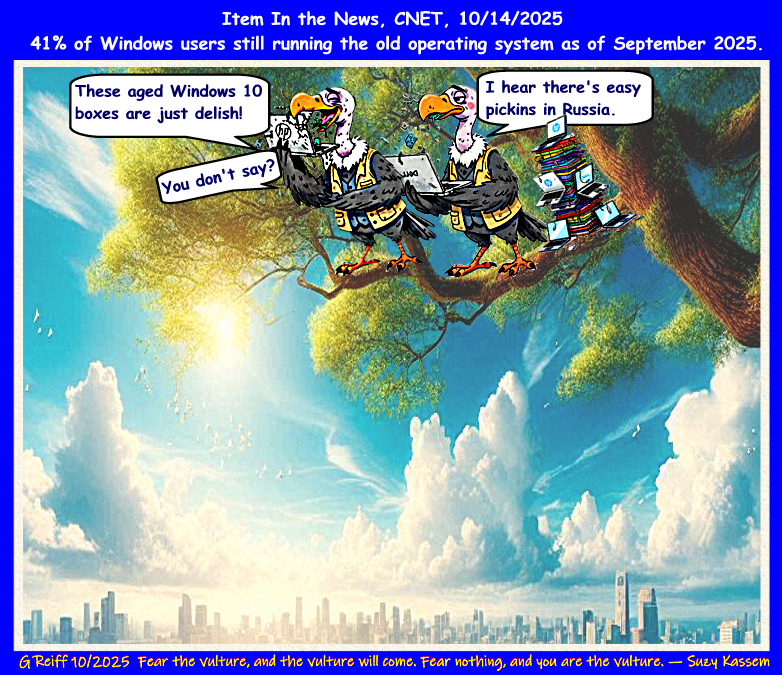

The End Is Nigh for Windows 10, Conclusion:
The Good, The
Bad, and The Ugly

The Good
When Windows 11
was first released, turning Secure Boot on in the UEFI settings, wiped
out my drive. I was fully backed up, so that wasn't so much of an
obstacle for me. Windows 11 was an immediate and obvious
improvement. On my strong endorsement of Windows 11, all but one
of my clients allowed me to upgrade their computers to Windows 11,
purchased a new Windows 11 PC.
Windows 11 is a very real improvement in operating system software. The Trusted Platform Module (TPM 2.0) provides for the storing of cryptographic keys securely. TPM 2.0 acts to protect credentials, certificates, and encryption keys from theft or tampering. Secure Boot ensures that ensures that the software that loads when the computer starts up is secure. Secure Boot blocks rootkits and boot-level malware before the OS even begins to load.
At the user level, Windows 11 offers much better memory management compared to earlier versions of the Windows OS. One way Windows 11 offers better use of computer memory is by allocating more available memory to apps that are currently active. As Microsoft, in its article, "How does Windows 11 handle memory management?," states clearly that "Windows 11’s memory management system is designed to optimize resource allocation for both Universal Windows Platform (UWP) apps and traditional Win32 applications." Benchmark tests have proven this true. So does my continued use of certain older 32bit applications.
The Bad
I do not and
never have thought that the Extended Security Updates program to extend
Windows 10 for an additional year makes much sense. Microsoft
wants it customers to use Windows 11, either by updating a Windows 11 PC
that CAN BE updated; or by buying a new machine. As I wrote in the
previous post, I am confident that Microsoft
will use Office to leverage its users to migrate to Windows 11.
While Microsoft guarantees that security updates will continue for a
year, there is also a clear statement that there will be no additional
feature updates. So, if the application a user needs requires new
features at the OS level, then that application may not work as it once
did.
Although the antimalware signature updates for Windows Defender will continue if the machine is enrolled in the Extended Security Updates, there is no guarantee that the Windows Defender engine will continue to be updated. Keeping the antimalware application itself up to date is as important as the daily signature files.
In our country today, things have dramatically changed since the time when the Extended Updates program was first announced. Now it seems elitist to think that $30 doesn't seem like much — not to mention the cost of buying a new machine. In my case, there was no cost to upgrade my Windows 10 notebook to Windows 11. For some work done, I was recently given a 2 year old HP Windows All-In-One desktop that was fully configured to run Windows 11. All my clients could afford to have me update their machines, and if they could not be upgraded, they could easily afford to purchase new machines. And, in either case, I could help them through the transition.
But now, there are millions of our fellow Americans who have had their ability to purchase food denied them. How can a parent who now cannot feed their kids come up with $30 to spend on a computer that still works fine? Millions of self-employed Americans will soon see their health insurance costs skyrocket. At one time in this country. the computer and an Internet connection were considered luxuries. In the Year of Our Lord, 2025, however, these utilities are necessities. For Pete's sake, you can't even make or keep a medical appointment without access to the web and an email.
Given the economic conditions in America today, Microsoft needs to reevaluate its position that forces its customers to spend additional scarce money to keep a working computer that is still working.
The Ugly
As I posited in my previous post, too many
people do not care about computer security. The same guy who runs
a red light in heavy traffic cares little about their or your safety.
That also applies to computer security; or the lack thereof. I
used the analogy of vultures feasting on "aged Windows 10 boxes" to
illustrate how all these no longer supported computers will become
magnets to malware. In today's interconnected world, one infected
machine that accesses a website used by many has the potential to infect
that website itself, and thus all the other computers that log on to
that website. As I have often said, "There is only one
network. That network is called the Internet. And we all
connect to it."
Let me offer a real world example here. How much of your personal information is stored on your lawyer's computer? Probably your social security number is in the possession of your attorney. If your attorney is working on some financial matter, much of the information about your credit accounts are stored on your lawyer's computers. I could go on, but the point is made. If your attorney doesn't keep his/her systems up to date, you are at risk. This same scenario will be played out across many different industries.
Conclusion
I
started out in this debate quite sympathetic to Microsoft's position.
Nevertheless, as I wrote this series in the context of our times, I came
to see this issue as a matter of the elites versus the people.
From the elitists' point of view, "$30 ain't that much. So, stop
complaining." Now, however, everyday folks can't afford food.
And you can't let them eat an upgrade. Moreover, too many
antisocial miscreants just won't upgrade, even if they have the means to
do so. And that leaves all computer users at risk.
Microsoft, please, be a better corporate citizen. Put this all on hold until such time as the majority have enough discretionary income, and thus the majority have the means to upgrade. In the meantime, launch a meaningful Public Service Announcement about the critical need to keep computers up to date. Otherwise, Microsoft, you will simply feed the vultures.

Please remember and never forget. In a shared network, one outdated device is all it takes to invite the vultures.
As cyber threats evolve, we need
to evolve as well.
—
Christopher A. Wray
Gerald Reiff